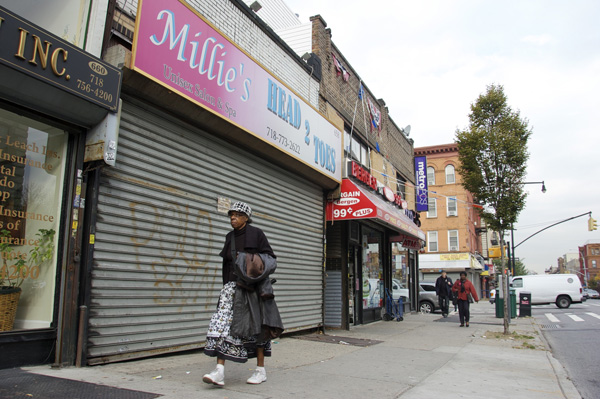
Photo by: Max J. Rosenthal
The storefront at 658 Nostrand Avenue in Crown Heights is slated to become a pub, but investor Mitch Polo says that the community board’s attempts to reduce hours threaten his ability to operate.
When Community Board 8’s newest committee met for the first time on Oct. 1, it already faced a massive task: ruling on the growing flood of liquor license applications in Crown Heights while managing the passionate local tensions that have accompanied them. Only one other community board in Brooklyn has dedicated a committee specifically to liquor licensing.
At the meeting, Kathleen Reilly, a resident of Bergen Street, rattled off a list of concerns about plans for an outdoor food-and-drink space across the street from her apartment: noise from patrons, trash on the streets and even the prospect of delivery trucks blocking the road. But another neighbor chimed in with full support, saying that their block sorely needed more activity: “If a full liquor license is what it takes, I’m all for it.”
So goes the battle over new bars and restaurants in a neighborhood where development has been uneven. While Franklin Avenue has boomed with upscale shops, bars and restaurants, many other major streets, like Nostrand Avenue, are still far less developed.
Applicants, along with some residents, say their establishments will encourage investment in the neighborhood and boost safety on the streets at night by keeping lights on and sidewalks busier. But other locals say that late-night hours–up to 4 a.m. in some requests–threaten to ruin the peace in residential areas. And both groups claim that their argument is the true measure of quality of life in Crown Heights.
While the community board’s approval is not necessary to obtain a license, their disapproval is noted in letters the board sends when applicants go before the State Liquor Authority, which issues the permits. With bars and restaurants eager to avoid such problems, squabbles over applications at the committee meetings can spark unusual drama.
The first item of the Oct. 1 meeting, an application from investors opening a pub on Nostrand Avenue, quickly became a contentious negotiation. The group requested a 4 a.m. closing time, but the committee rejected the request, with one member saying his colleagues needed to “mitigate the development trends in our neighborhood.” The committee offered the standard compromise hours they have developed over the past year: 1 a.m. on weeknights and 2 a.m. on weekends.
Mitch Polo, one of the investors, shook his head in frustration as he pressed for the later hours he said his business model required. Committee members pushed back with worries about noise, but Polo, repeatedly whispering to his lawyer, refused to yield.
After several breaks for consultation and several more hours of stalemate, neither side had budged. The committee voted to support the application, but would only consent to a 3 a.m. weekend closing. Polo insisted he would press for 4 a.m. at the liquor authority despite the committee’s conditions.
Barbara Brown-Allen, a local pro-business activist, was one of three attendees to speak in favor of the project. She approved of Polo’s defiant stance and blasted the committee’s decision as shortsighted. “Any fool would know that in the economical development in any up-and-coming neighborhood, the bars come first,” she thundered.
The volume of new applications has risen from one or two per month in past years to as many as 10 per month in 2012, prompting the formation of the new liquor licensing committee.
In one of the board’s final actions before starting the new committee, board members in August rejected an application from Catfish, a planned bar-restaurant on Bedford Avenue which wanted a 4 a.m. closing time. Maxx Colson and Aaron Giroux, two of the co-owners, said they made the request in part because they believe late-night activity will make the street safer.
Catfish’s plans sparked a major protest from its neighbors. Nearby residents formed the Rogers Avenue Block Association, which considers the safety argument a fig leaf. “Past dusk, the neighborhood feels secure now: the local streets are never desolate,” the group wrote in response to a reporter’s questions, calling potential security benefits “highly questionable.”
The block association lobbied the community board with letters expressing fears about noise and the prospect of drunk patrons spilling out into the streets. The association members even appealed to City Councilwoman Letitia James, who wrote to the board in support of earlier closing hours.
Development itself, the association insisted, is not the problem. “We just want to see it happen at a healthy pace,” wrote the group, “with newcomers listening to the community that helped build the neighborhood into what it is today while being respectful of quality of life issues.”
But as the applications of Catfish and other bars or restaurants wind their way through the approval process, it’s still unclear whose quality of life will win the argument.








